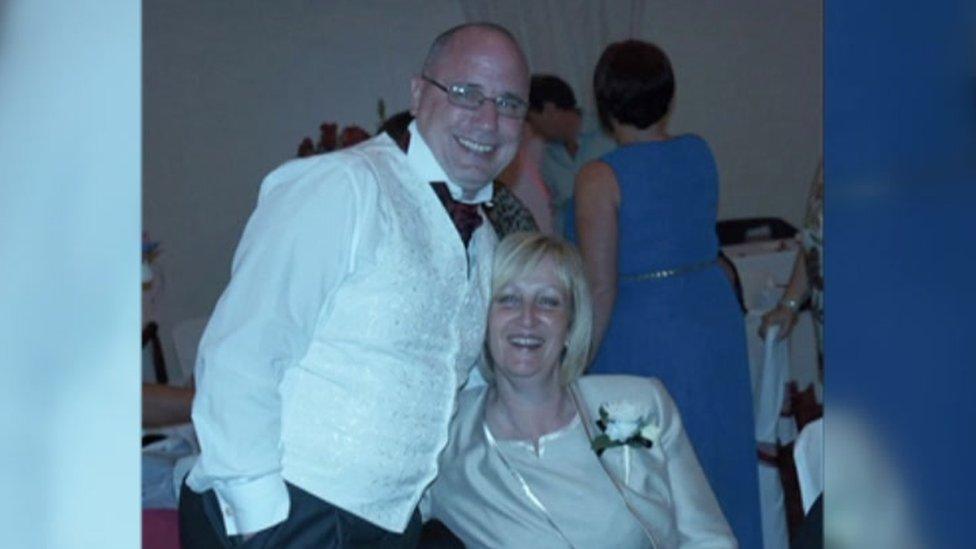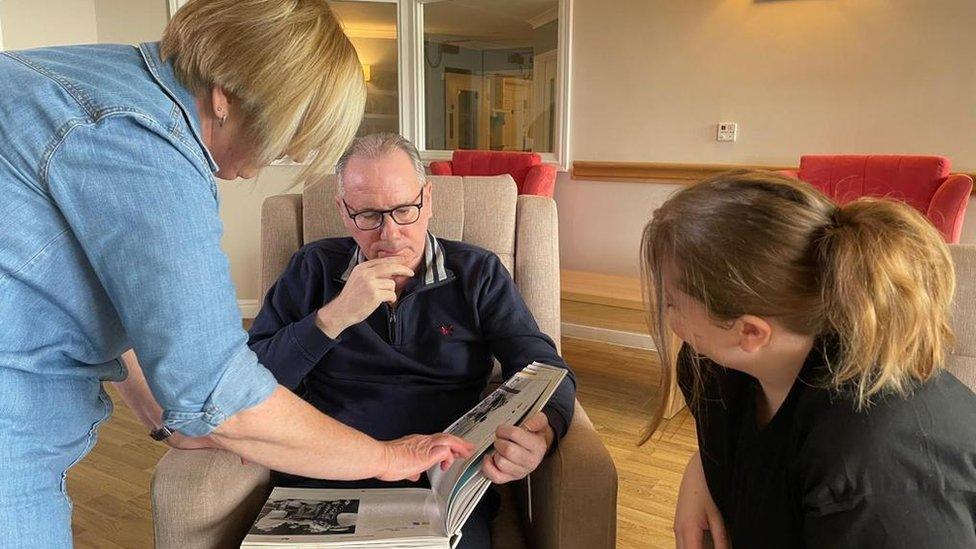Bruce Willis: Dementia diagnosis gives woman awareness hope
- Published

Ian Burton was diagnosed with frontotemporal dementia (FTD), aged 50
The wife of a man with the same form of dementia as Bruce Willis has said she hopes the star's case will raise awareness of the disease.
Wendy Burton's husband Ian was diagnosed with frontotemporal dementia (FTD) in 2014 after she noticed a change in his behaviour.
FTD is caused by progressive nerve cell loss in the brain and affects personality and language.
Willis, 67, had already given up acting after being diagnosed with aphasia.
Mrs Burton said she first noticed there was something wrong with her husband of 36 years in 2013, when his behaviour began to change.
"We didn't think he was ill - I actually thought my marriage was breaking down because he seemed to ruin everything that we were trying to do," she said.
"He couldn't understand empathy, he couldn't plan anything which is why he was getting into trouble at work. It was a complete change in personality.
"We just couldn't work out what was going on."

Mr Burton's family is spending as much time with him as possible, as his condition deteriorates
The couple also knew Mr Burton had work problems at Derbyshire Police, where he helped with technical support.
The issues became so bad that the force encouraged him to have an occupational health check-up, when doctors said he may have a brain tumour.
Mrs Burton said: "I told him that we both know that something's wrong and maybe this will be a catalyst that means we will find out why.
"It was on the MRI scan that it clearly showed that he had FTD. There was lots and lots of shrinkage around the brain."
Mrs Burton says their three children and two grandchildren are spending as much time with the couple as they can, as Mr Burton's health deteriorates.

Actor Bruce Willis, 67, has been diagnosed with frontotemporal dementia
On Friday, the family of Bruce Willis confirmed he had been diagnosed with FTD.
He was originally diagnosed with aphasia - which causes difficulties with speech - last year, but this has progressed and he has been given a more specific diagnosis, his family said.
Frontotemporal dementia is caused by a build-up of toxic proteins in the frontal and temporal lobes of the brain (those behind the forehead and ears), which are thought to kill brain cells.
Damage to these regions affects language (such as Willis's aphasia) as well as behaviour and the ability to plan.
BBC health and science correspondent James Gallagher said on average, people live eight to 10 years after diagnosis of frontotemporal dementia, but some people live much longer.

Mr Burton's family hope to raise awareness about the disease
Mrs Burton, who now works as a dementia adviser at Making Space in Derby, said she hoped Willis's case would shine a light on the disease.
"It's a sad misfortune that somebody's got this disease, but if there's somebody high-profile that can spread the word and make people understand that dementia is all around Alzheimer's," she said.
"Doctors can treat some of the symptoms, but there's still no treatment for FTD itself.
"It is difficult because we just know we're on a downward spiral. We just have to try and enjoy every minute we've got with him and make the most of it."

Follow BBC East Midlands on Facebook, external, on Twitter, external, or on Instagram, external. Send your story ideas to eastmidsnews@bbc.co.uk, external.
Related topics
- Published17 February 2023

- Published17 February 2023
